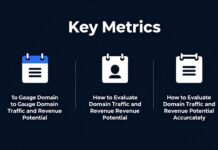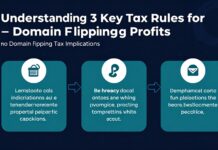Valuing a domain name like a professional appraiser can seem daunting, but it’s a crucial skill for anyone involved in the buying and selling of domain names. Whether you’re a seasoned investor or a newbie looking to make a profit, understanding how to assess the worth of a domain is vital. How do experts determine the value of a domain? What factors should you consider when trying to estimate its price? In this article, we’ll break down the process of domain valuation and give you the tools you need to evaluate domains effectively.
First, it’s important to recognize that domain appraisal isn’t just about the name itself; it involves a variety of elements that can influence its overall value. From keyword relevance and market trends to brandability and historical sales data, each factor plays a significant role in determining how much a domain might be worth. Have you ever wondered why some domains sell for thousands while others barely fetch a few dollars? The answer lies in understanding these nuances. By learning to value a domain like a professional appraiser, you’ll not only enhance your investment strategies but also boost your negotiating power when it comes to buying or selling.
Additionally, we’ll explore some practical tips and tools that appraisers use to analyze domains effectively. Armed with this knowledge, you’ll be able to make informed decisions and maximize your return on investment. So, are you ready to unlock the secrets of domain valuation? Let’s dive in and transform the way you view the world of domain names!
Mastering Domain Valuation: 10 Expert Tips to Assess Your Domain’s True Worth
Valuing a domain name can be a tricky business. Many people think that it’s just about picking a catchy name and hoping for the best. But there’s more to it than that. If you want to navigate the domain marketplace in New York like a pro, you gotta have a good understanding of domain valuation. Here, we’ll explore 10 expert tips that can help you assess your domain’s worth, almost like a professional appraiser would do.
Understand the Basics of Domain Valuation
Before diving into the deep end, it’s crucial to grasp the fundamentals of domain valuation. Several factors contribute to a domain’s worth, including:
- Length: Shorter domains are usually more valuable.
- Keywords: Domains with popular keywords tend to rank better on search engines, increasing their value.
- TLD (Top-Level Domain): .com domains are typically valued higher than others like .net or .info.
- Brandability: A name that is easy to remember and spell increases its appeal.
Research Comparable Sales
One way to evaluate your domain is to look at sales data for similar domains. Websites like NameBio and DNJournal provide records of domain sales that can give you a ballpark figure. You can search these databases by keyword, TLD, and length to find domains that are similar to yours.
Use Online Valuation Tools
There are numerous online tools that can assist you in estimating the value of your domain. Some popular ones include:
- Estibot: This tool gives a quick estimate based on various criteria.
- GoDaddy Domain Appraisal: Offers a valuation based on historical data and current trends.
- Sedo: Provides a marketplace for buying and selling domains, and it also offers evaluations.
Analyze Traffic and SEO Metrics
A domain’s traffic can greatly influence its value. If your domain already attracts visitors, it’s more likely to sell for a higher price. Use tools like Google Analytics to check:
- Monthly visitors
- Bounce rate
- Organic search rankings
These metrics can help you present a strong case when negotiating a sale.
Check Branding Potential
Domains that are easy to brand often fetch higher prices. If your domain has the potential for a strong brand identity, it may be wise to seek higher offers. Ask yourself:
- Does the name convey a message?
- Is it unique enough to stand out in a crowded market?
- Can it be easily pronounced and remembered?
Consider the Age of the Domain
Older domains can often command higher prices due to established trust and authority. Many buyers look for domains that have been around for a while because they may already have backlinks and traffic. You can check a domain’s age using WHOIS lookup services.
Evaluate the Legal Aspects
Before selling or buying a domain, it’s essential to ensure that there are no legal issues attached. Check for trademarks associated with the name. If you find that your domain infringes on someone else’s trademark, its value could be significantly diminished.
Assess the Market Demand
The current demand for specific types of domains can fluctuate. If a trend emerges—like new technology or popular culture references—domains that relate to those trends might increase in value. Keeping an eye on market trends can help you time your sale perfectly.
Seek Professional Appraisals
If you’re serious about getting an accurate valuation, consider hiring a professional appraiser. They can provide a detailed report that factors in multiple elements, including:
- Market conditions
- Domain history
- Comparable sales data
Though it may cost you some money, it’s often worth it for the accuracy.
Understand the Psychological Aspect
Sometimes, the worth of a domain is subjective. A buyer might be willing to pay a premium simply because they love the name. Understanding your audience’s psychology can help you position your domain effectively. Think about:
- Emotional appeal
- Target market
- Potential uses
If you can tap into what buyers want, you might find yourself with a more lucrative offer.
When it comes to understanding and mastering domain valuation, it’s a combination of art and science. By leveraging these ten expert tips, you can effectively assess your domain’s true worth like a professional appraiser would. Whether you’re looking to buy or sell, knowing what factors contribute to a domain’s value can empower you to make informed decisions in the bustling New York domain marketplace. So, get out there and start evaluating!
The Ultimate Guide to Domain Appraisal: 7 Key Factors That Influence Value
When it comes to domain appraisal, understanding the factors that influence a domain’s value is crucial for buyers and sellers alike. The world of domain names can be quite complex, and valuing a domain like a professional appraiser is not as easy as it seems. In this guide, we will explore seven key factors that affect domain value, giving you the tools needed to navigate this often murky water.
1. Domain Length Matters
Shorter domains tend to have higher value compared to longer ones. A concise and memorable domain, like “apple.com”, is generally more sought after than a lengthy, complex one. Here’s a quick breakdown:
- 1-3 characters: Extremely valuable, often selling for millions.
- 4-6 characters: Still valuable, especially if it’s a common word or acronym.
- 7+ characters: Usually less desirable unless they contain a specific keyword or phrase.
2. Keywords are Key
The presence of keywords in a domain can significantly increase its worth. Domains that contain popular search terms can rank higher in search engines, making them attractive to businesses. For example, “bestcoffee.com” could command a higher price than “myfavoritebeverage.com” simply because it’s more relevant to what users are searching for.
- Exact Match Domains (EMD): These are domains that are the exact match of a searched keyword (like “buyshoes.com”). They usually have higher value.
- Partial Match Domains: These contain the keyword but also include additional words (like “greatbuyshoes.com”). Their value is generally lower than EMDs.
3. Domain Extension Impact
The domain extension, or TLD (Top-Level Domain), also plays a critical role in valuation. While “.com” domains are the most popular and often the most valuable, other extensions can be valuable too depending on the context.
- .com: Most valuable, universally recognized.
- .org: Often carries value for non-profit organizations.
- .net: Secondary option, still valuable but less than .com.
- Country-specific TLDs: These can be valuable in their respective countries (like .co.uk or .de).
4. Age of the Domain
Older domains typically hold more value than newly registered ones. If a domain has been around for a while, it may have established backlinks, credibility, and a history that can contribute to its value.
- Domain age: Domains that are over ten years old usually sell for a higher price.
- History: If a domain has a clean history with no penalties, its value can increase drastically.
5. Brandability
A domain’s potential to become a recognizable brand also affects its value. A domain that is easy to pronounce, spell, and remember can be worth much more than a generic or complicated one. Consider names that evoke emotion or have a strong visual association.
- Memorable names: These can create strong brand identities (like “Nike.com”).
- Unique combinations: Using inventive word combinations can increase brandability (like “Spotify.com”).
6. Market Demand and Trends
The current market demand can heavily influence domain value. For example, if a certain industry is booming, relevant domains can skyrocket in value. It’s essential to keep an eye on trends and emerging markets.
- Tech trends: Domains related to AI or blockchain might see increased demand.
- Health industry: With the rise of health awareness, domains related to wellness may also gain value.
7. Selling History
Lastly, the past selling history of a domain can provide insight into its current value. If similar domains have sold for high prices in the past, this might suggest that your domain could fetch a good price too.
- Auction sites: Platforms like GoDaddy and Flippa often showcase selling prices and trends.
- Comparable sales: Research past sales of similar domains to gauge potential value.
Putting it all together, valuing a domain like a professional appraiser involves assessing these seven factors carefully. It’s not just about what you think your domain is worth; it’s about understanding the market, trends, and the intrinsic value based on the criteria above.
Remember, domain appraisal isn’t an exact science, and many variables can come into play. By focusing on these key factors and keeping a pulse on industry trends, you can approach domain valuation with a more informed perspective. Whether you’re buying or selling, knowledge is your best ally in the domain marketplace.
How to Determine Domain Value Like a Pro: 5 Essential Methods Every Seller Should Know
Determining the value of a domain name can be a tricky business, especially for sellers who want to maximize their profits. Many factors can influence a domain’s worth, and understanding these can help you sell like a pro. If you’re looking to get into the domain marketplace scene in New York and wanting to know how to value a domain like a professional appraiser, you’ve come to the right place. Here are five essential methods that every seller should know.
1. Research Comparable Sales
One of the best ways to estimate a domain’s value is to look at similar domains that have sold recently. This method is often called “comps” in real estate, and it works similarly for domains. Websites like NameBio and DNJournal keep track of past domain sales and can give you a good idea of what buyers are willing to pay.
- Steps to follow:
- Search for domains with similar keywords.
- Check the sales price of those domains.
- Analyze the trends in pricing based on extensions (.com vs .net, etc.).
For example, if a domain with the keyword “fitness” sold for $10,000, but a similar one sold for only $1,500, it might indicate that niche domains can vary greatly in value depending on the specifics.
2. Evaluate Domain Length and Memorability
Shorter domains tend to be more valuable because they are easier to remember and often more brandable. One-syllable or two-syllable domains are generally seen as more valuable than longer alternatives.
- Key points to consider:
- Length: Aim for domains that are 15 characters or fewer.
- Spelling: Avoid complex spellings; easy-to-spell domains are worth more.
- Pronunciation: Domains that roll off the tongue can fetch higher prices.
For instance, “Cars.com” is obviously more valuable than “BestCarDealsIn2023.com” due to its brevity, clarity, and brand potential.
3. Check Keyword Popularity
The keywords in a domain name can significantly impact its value. If the keywords are highly searched in Google, that can increase the domain’s desirability.
- Tools to use:
- Google Keyword Planner: Check search volumes for specific terms.
- SEMrush or Ahrefs: Analyze competition and keyword difficulty.
To illustrate, a domain like “VeganRecipes.com” may have higher traffic potential and thus higher value than a niche like “BestVeganFoodInTheWorld.com”.
4. Analyze the Domain’s Age
Older domains can often be more valuable than new ones. This is because they may have built up trust and authority in search engines over time. An established domain can often rank better and faster in search results, making it more appealing to buyers.
- Factors to consider:
- Domain registration date: Check how long the domain has been registered.
- Backlink profile: Older domains may have accumulated valuable backlinks.
For example, a domain registered in 2000 may be more valuable than one registered in 2021 due to its age and associated trust.
5. Assess Market Trends
The domain market, just like any other market, is subject to trends. Keeping an eye on what types of domains are selling can help you understand where the market is heading.
- Tips for spotting trends:
- Follow domain industry news: Websites like DomainInvesting.com or TheDomains.com provide insights.
- Participate in domain forums: Engage with communities on sites like NamePros to see what’s hot.
- Observe tech trends: Domains related to emerging technologies (like AI or blockchain) might have higher short-term value.
For instance, during the pandemic, domains related to health, online education, and remote work saw significant price increases.
Quick Reference Table of Domain Value Factors
| Factor | Impact on Value | Notes |
|---|---|---|
| Length | Higher value for shorter | Aim for under 15 characters |
| Keyword Popularity | Positive correlation | Use tools to assess search volume |
| Age | Older = higher value | Established domains often rank better |
| Comparable Sales | Price-setting | Research recent sales for benchmarks |
| Market Trends | Fluctuating values | Stay updated on industry news |
In summary, valuing a domain like a professional appraiser involves a mix of research, analysis, and an understanding of market dynamics. Each of these methods contributes to a fuller picture of a domain’s worth. By applying these strategies, sellers can make informed decisions that can lead to successful transactions. Remember, the domain marketplace is constantly evolving, so staying informed is key to navigating it effectively.
Understanding Domain Valuation Metrics: What Every Investor Must Consider for Maximum ROI
In the fast-paced world of domain investing, understanding domain valuation metrics is crucial for anyone looking to maximize their return on investment (ROI). Investors often underestimate the significance of a well-evaluated domain name, leading to missed opportunities and poor financial decisions. Knowing how to value a domain like a professional appraiser can set you apart from the competition.
Key Metrics in Domain Valuation
When it comes to valuing a domain, several key metrics come into play. These metrics can help you determine the potential worth of a domain name and make informed decisions. Here are some important factors to consider:
- Length of the Domain: Generally, shorter domain names tend to be more valuable. A two or three-letter domain is often considered premium.
- Keywords: Domains that contain popular keywords relevant to a specific niche or industry can significantly increase in value. Search engines favor these keywords, improving SEO.
- Domain Extension: The extension (TLD) of a domain plays a role as well. For example, .com domains are typically more valuable than .net or .org.
- Brandability: A catchy, memorable name can attract buyers. Think about how easy it is to spell or pronounce the domain.
- Market Trends: Keeping an eye on trends within your niche can help you understand how demand fluctuates. A domain in a growing industry might fetch a higher price.
Historical Context of Domain Valuation
In the early days of the internet, domain names were often registered as a novelty. As online businesses grew, so did the importance of having the right domain name. For instance, in 2007, the domain “sex.com” sold for a whopping $13 million. Such sales highlighted the potential for profit in domain investing and spurred many people to enter the market.
The domain industry has evolved over the years, with many tools and services emerging to help investors accurately value domains. Professional appraisers now use a combination of qualitative and quantitative measures to assess domain worth.
Valuation Methods Used by Professionals
Professional appraisers often use several methods to value domains. Some of these methods include:
Comparative Sales: Look at recent sales of similar domains to estimate your domain’s value. This method often requires thorough research into sales databases.
Income Approach: This method involves estimating the potential income a domain can generate through advertising or resale. It’s particularly useful for domains that are already generating revenue.
Cost Approach: This approach considers the cost of creating a similar domain, including registration fees and development costs.
Market Analysis: Analyzing market trends and demand for certain keywords or phrases can give insights into potential future value.
Practical Examples of Domain Valuation
To illustrate how these metrics apply in real-world scenarios, let’s look at some examples of domain names and their valuation factors.
Example Domain: “BestCoffee.com”
- Length: 10 characters (moderate)
- Keywords: “Best” and “Coffee” are highly searched terms.
- TLD: .com, which is the most popular.
- Brandability: Very brandable, easy to remember.
- Market Trends: Coffee-related businesses are booming.
Example Domain: “XYZ123.com”
- Length: 6 characters (short)
- Keywords: No relevant keywords.
- TLD: .com.
- Brandability: Less brandable; harder to remember.
- Market Trends: No specific trend related to “XYZ123”.
Quick Reference: Domain Valuation Checklist
When appraising a domain name, consider this checklist:
- Is the domain name short and easy to spell?
- Does it contain relevant keywords?
- What’s the TLD?
- How brandable is the domain?
- What’s the current market demand for similar domains?
Tools for Domain Valuation
There are various online tools available to help you assess the value of a domain. Some popular tools include:
- Estibot: Offers automated evaluations based on multiple factors.
- GoDaddy Appraisal Tool: Provides a quick estimate based on past sales.
- Sedo: A marketplace that also offers valuation services.
In conclusion, mastering the art of domain valuation is not just about crunching numbers; it’s about understanding market dynamics and applying various metrics effectively. By considering the factors outlined above, potential investors can position themselves for success in the ever-evolving domain market. Whether you’re a seasoned investor or just starting out, knowing how to value a domain like a professional appraiser can help you make smarter, more profitable decisions.
Top 8 Domain Valuation Mistakes: Avoid These Pitfalls to Get the Best Price for Your Asset
When it comes to domain valuation, many people are often confused and make mistakes that can cost them big time. Whether you’re a seasoned investor or just starting out, knowing how to value a domain like a professional appraiser is essential. The domain market can be unpredictable and each domain is unique, but avoiding common pitfalls can help you get the best price for your asset. Let’s dive into the top 8 domain valuation mistakes you should avoid.
1. Ignoring Market Trends
One of the biggest errors you can make is ignoring what’s happening in the domain market. Trends change fast, and what was valuable yesterday may not hold the same weight today. For instance, the rise of new technologies or changes in consumer behavior can impact the value of certain keywords.
- Research current market values for similar domains.
- Subscribe to domain industry newsletters to stay informed.
2. Overvaluing Personal Attachment
A common mistake that sellers make is letting their personal feelings cloud their judgment. Just because you think a domain is special doesn’t mean others will. Professional appraisers base their valuations on data, not emotions.
- Look at the objective metrics rather than personal biases.
- Consider what the domain would be worth to someone else, not just to you.
3. Neglecting Comparable Sales Data
Failing to look at comparable sales data is another misstep. This data can provide you with insight into how similar domains were valued and sold. Professional appraisers often use this information to gauge the market.
- Use sites like NameBio to find past sales of similar domains.
- Analyze the price per keyword relevance and domain length.
4. Overestimating Brandability
While a catchy domain name is important, overestimating its brandability can lead to inflated expectations. Not every short or unique name is valuable, and the market doesn’t always reflect your perception of a great brand.
- Evaluate the domain’s potential for branding based on industry standards.
- Check if similar names have been successful in branding.
5. Failing to Assess SEO Value
The SEO potential of a domain plays a huge role in its valuation. Many sellers overlook this crucial aspect. A domain with a strong backlink profile, good traffic, or relevant keywords can be worth significantly more.
- Use tools like Ahrefs or SEMrush to analyze SEO metrics.
- Check the domain’s history to see if it has been penalized by search engines.
6. Not Considering the Length of the Domain
Shorter domains typically command higher prices because they are easier to remember and type. However, many people overlook the importance of length when valuing domains.
- Aim for domains that are under 15 characters.
- Avoid using hyphens or numbers, which can confuse potential buyers.
7. Ignoring the Extension Factor
The extension of a domain (like .com, .net, or .org) plays a critical role in valuation. .com domains generally hold more value than others. But many sellers fail to consider how the extension affects price.
- Keep an eye on the popularity of different extensions.
- Consider the relevance of the extension to the target audience.
8. Underestimating the Importance of a Good Appraisal
Finally, many people simply do not get a professional appraisal. This can lead to serious miscalculations in valuation. Appraisers have tools and experience that can provide a more accurate estimate than a simple search online.
- Invest in a professional appraisal service for accurate valuation.
- Compare multiple appraisals to find a consensus on value.
Key Takeaways
Valuing a domain like a professional appraiser requires a careful analysis of various factors. Here’s a quick bullet point list to keep in mind:
- Stay updated on market trends.
- Avoid letting personal attachment influence your valuation.
- Use comparable sales data to guide your expectations.
- Assess the brandability objectively.
- Evaluate SEO value thoroughly.
- Remember that shorter domains usually have higher value.
- Consider the impact of domain extensions on price.
- Don’t skip out on getting a professional appraisal.
By recognizing these common mistakes, you can position yourself better in the domain marketplace. Understanding how to value a domain correctly can help you maximize your returns and avoid losing money on what could be a valuable digital asset. So, take the time to educate yourself and avoid these pitfalls when valuing your domains. An informed approach can make all the difference in your success in this dynamic market.
Conclusion
In conclusion, valuing a domain like a professional appraiser involves a comprehensive understanding of various factors that contribute to its worth. By analyzing metrics such as domain age, keyword relevance, traffic statistics, and market trends, you can develop a well-rounded assessment. Additionally, leveraging tools and services that specialize in domain appraisal can provide valuable insights and enhance your valuation process. Remember to consider the potential for branding and the overall demand within the market as these can significantly influence a domain’s value. As you embark on your domain valuation journey, keep these key elements in mind to ensure an accurate and informed appraisal. Whether you’re buying, selling, or investing, applying these professional techniques will empower you to make smarter decisions. Don’t hesitate to put your newfound knowledge into practice—start evaluating your domains today and unlock their true potential!













